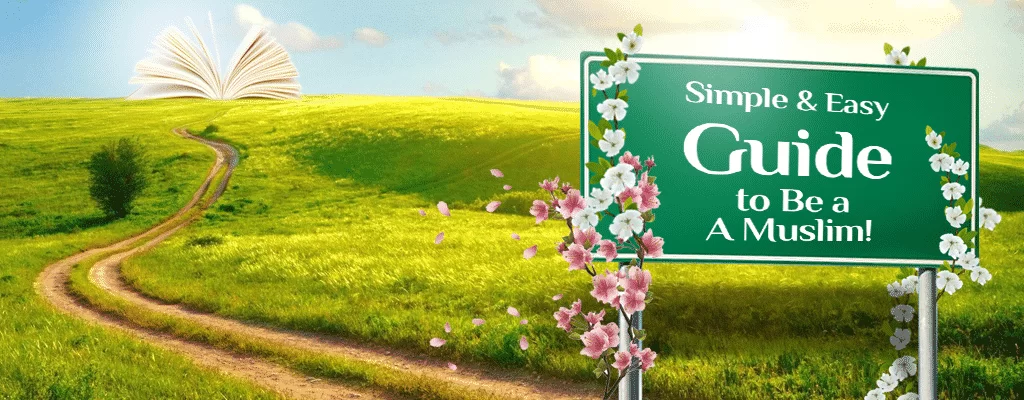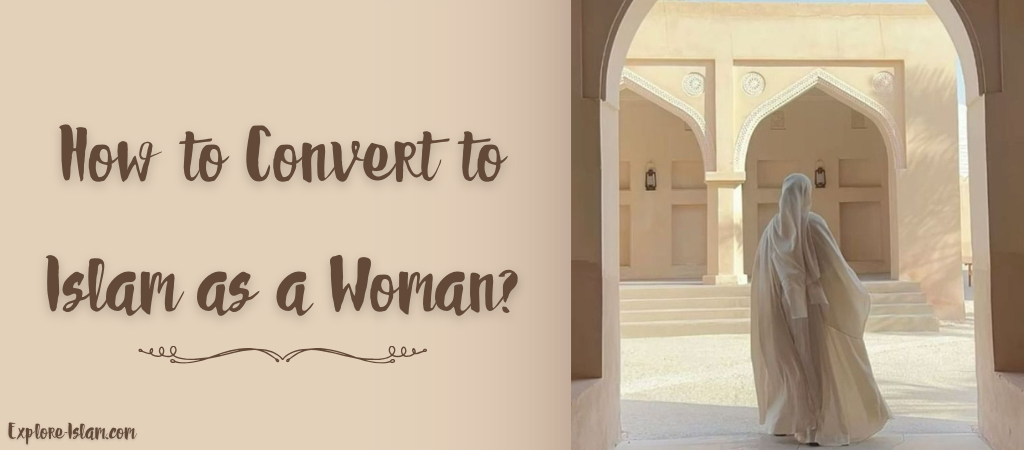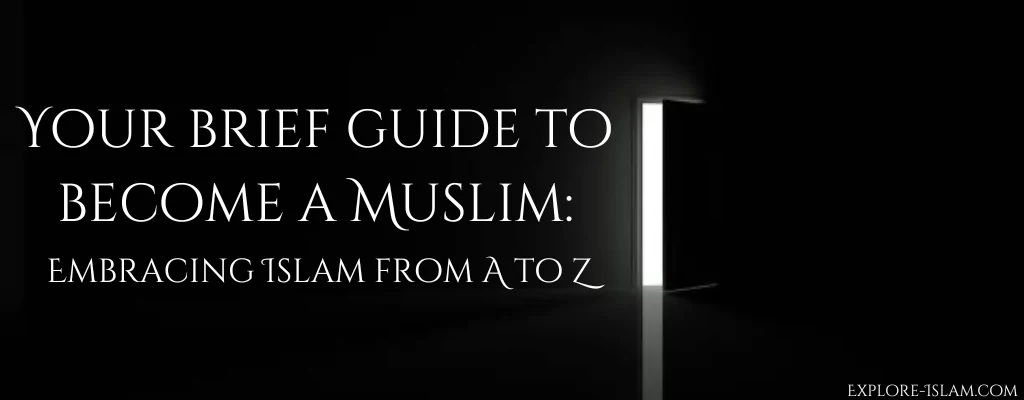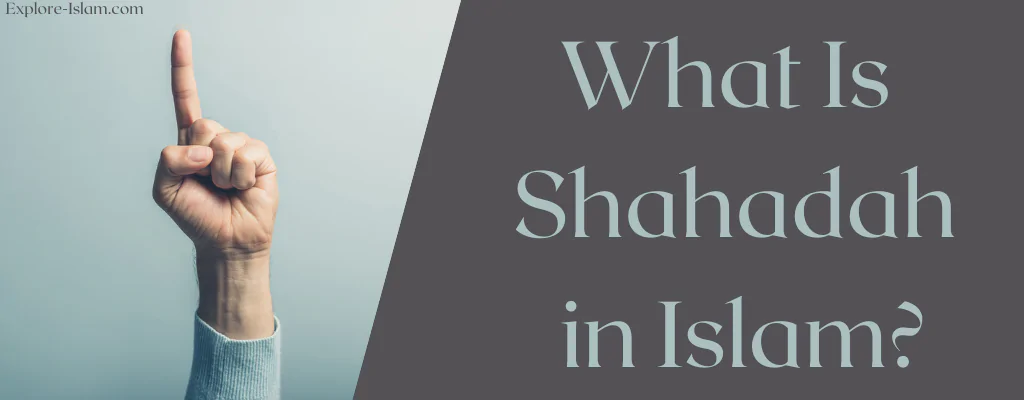Are you curious about Islam, the religion embraced by over a billion people worldwide and one of the fastest-growing faiths in the West? This article delves into key aspects of Islam, answering questions like whether it’s a religion, place, or country, exploring its symbol, the founder of Islam, the time it emerged, the number of Muslims globally, Islam’s core message of peace, and the essential rules and resources that guide its followers. Keep reading for deeper insights!
What is Islam Religion?
Islam is a monotheistic faith centered on the belief in one God, Allah, and is based on the teachings of Prophet Muhammad (peace be upon him) and a comprehensive way of life. It is one of the world’s major religions, followed by over a billion people globally, and has a rich history rooted in peace, devotion, and submission to God’s will.
- Symbol of Islam
Unlike Christianity or Judaism, Islam does not have an official religious symbol. While the crescent moon and star are often associated with Islam, the faith’s central focus is on the oneness of God, and the practices outlined in the Quran and Sunnah. - Founder of Islam
Islam, in its final and complete form, was revealed to Prophet Muhammad (peace be upon him). While Islam existed since the time of the first prophet, Adam (PBUH), Muhammad (PBUH) is the final messenger who brought the Quran. - Time of Islam’s Emergence
Islam formally emerged around 610 CE when Prophet Muhammad (peace be upon him) began receiving revelations. The Quran was revealed over 23 years, marking the establishment of Islam as a distinct religion. - Number of Muslims
Islam is the fastest-growing religions globally, with over 2 billion Muslims worldwide. It is practiced across various continents, with Indonesia being the largest Muslim-majority country. - Islam as a Religion of Peace
Islam is fundamentally a religion of peace, with its name derived from the Arabic word for peace, “salam.” The Quran emphasizes peace, reconciliation, and compassion, urging Muslims to embrace peace, even with adversaries, whenever possible. - Main Rules of Islam
The Five Pillars of Islam—Shahadah (faith), Salah (prayer), Zakat (charity), Siam (fasting), and Hajj (pilgrimage)—are essential practices for every Muslim. These principles guide Muslims in their worship, social responsibility, and personal conduct, promoting justice and kindness. - Main sources of Islam: Islam follows the guidance found in the Quran and the authentic traditions of Prophet Muhammad (PBUH).
Let’s explore these points in detail.
Is Islam a Religion, Place, or Country?
Islam is unequivocally a religion—not a place, nor a country. Here’s why:
- Submission to Allah: The word Islam itself means “submission to the will of Allah”, highlighting its essence as a spiritual system devoted to worshiping one God (Allah).
- Sacred Texts: Islam is grounded in divine revelation, particularly the Quran and the Sunnah (the teachings and practices of Prophet Muhammad, peace be upon him). These texts serve as the primary sources of Islamic belief and law.
- Core Religious Practices: The Five Pillars of Islam—testimony of faith (shahada), prayer (salah), charity (zakat), fasting during Ramadan (sawm), and pilgrimage to Mecca (hajj)—underscore Islam’s identity as a structured religious faith.
- Historical Roots: Prophet Muhammad (PBUH) preached a religious message, not a political or national one. His mission centered on conveying the Quran and establishing a community grounded in religious values.
- Universal Teachings: Islamic teachings cover a wide range of ethical, spiritual, and social topics, including peace, justice, morality, and the nature of God—further confirming its status as a religion.
While Islam has influenced cultures and contributed to the development of Muslim-majority nations, Islam itself is not a place or a country. It is a universal faith practiced by over a billion people in diverse countries worldwide. The religion’s origins trace back to Prophet Adam (PBUH), long before the formation of modern nations, emphasizing its timeless and borderless nature.
What Is Islam Religion Symbol?
Unlike the cross in Christianity or the Star of David in Judaism, Islam does not have a single, universally recognized religious symbol. The focus in Islam is on monotheism (Tawheed)—the Oneness of God (Allah)—and the guidance found in the Quran and Sunnah (the teachings and practices of Prophet Muhammad, peace be upon him).
Here’s why Islam is not defined by a symbol:
- Central Tenet is Verbal, Not Visual: The Shahadah—the testimony of faith declaring belief in Allah and the finality of Prophet Muhammad (PBUH)—is a verbal declaration mainly reflecting the inner belief, not a visual representation. Also, the five pillars of Islam are expressions of faith through action, not symbols.
- Quran and Sunnah as Core Sources: The Quran is regarded as the literal word of God and holds the highest authority in Islam. It, along with the Sunnah, forms the foundation of Islamic belief and practice.
- Peace as a Value, Not a Symbol: The Arabic word salam (peace) reflects a fundamental Islamic value and is commonly used in greetings, but it is not used as an official symbol.
While the crescent moon and star are often associated with Islam in cultural or national contexts (e.g., on flags or mosques), they are not religiously mandated symbols and are not mentioned in the Quran or Hadith. Scholars often trace their use to historical empires, such as the Ottoman Empire, rather than to Islamic theology itself.
In summary, Islam places emphasis on belief, worship, and practice rather than symbolic representation. There is no official religious symbol in Islam; instead, the Shahadah and the teachings of the Quran and Sunnah serve as the true identifiers of the faith.
Who Founded Islam Religion?
The answer to who founded Islam depends on how the term “founded” is understood.
In the context of final revelation, Prophet Muhammad (peace be upon him) is widely recognized as the founder of Islam. He is the last and final messenger chosen by Allah, through whom the Quran, the final divine scripture, was revealed. He established the complete and preserved form of Islam that is practiced by Muslims today.
However, Islam is not considered a new religion. According to Islamic belief, Islam means “submission to the will of Allah”, and this message has existed since the creation of humankind. Prophet Adam (peace be upon him)—the first human—was also the first prophet, and he, along with others like Noah, Abraham, Moses, and Jesus (peace be upon them all), preached the same core message of monotheism and obedience to God.
Thus, while Prophet Muhammad (PBUH) is the seal of the prophets and the one who delivered Islam in its final and complete form, the essence of Islam predates him. Islam is a belief in one God and submission to His will that began with Adam and continued through all prophets.
Read for more: Who Is the Founder of Islam?
When Did Islam Become a Religion?
Islam in its final, complete form—with the Quran as its scripture and Prophet Muhammad (peace be upon him) as the final messenger—began around 610 CE. This marked the start of Muhammad’s prophethood, when he received the first revelation of the Quran while meditating in the Cave of Hira, near Mecca.
After he had been asked by Almighty God to spread the message, Prophet Muhammad (PBUH) began to publicly preach the message of Islam, calling people to worship one God and live by the guidance revealed to him. This period marks the formal establishment of Islam as a distinct and complete religion.
Hence, the core belief of Islam is considered eternal, while the official beginning of Islam as a complete religion with the Quran and Prophet Muhammad occurred around 610 CE.
How Many People Practice Islam Religion?
In the year 2024, the Muslim population reached more than 2 billion worldwide (around 25.8 % of the global population).
- Islam has been described as the “fastest-growing religion” since at least 1997, with steady increases in adherents across continents.
- The growth is not confined to traditionally Muslim regions—Islam is expanding rapidly in Western countries as well, driven by both conversions and natural population growth.
- Many individuals are drawn to Islam’s message of peace, justice, and spiritual clarity, leading millions to embrace the faith worldwide.
- Indonesia holds the title of the largest Muslim-majority country, demonstrating Islam’s spread far beyond the Middle East.
It’s important to note that while many identify as Muslims, the level of actual religious practice may vary by individual and community. Not all behaviors seen in Muslim societies necessarily reflect the true teachings of Islam, which are based on the Quran and the authentic traditions of Prophet Muhammad (peace be upon him).
In summary, Islam is practiced by over a billion people worldwide, with its influence continuing to grow across diverse cultures and regions.
Is Islam a Religion of Peace?
Islam is fundamentally a religion of peace, derived from the Arabic root s-l-m, meaning both peace and submission to the will of Allah. Its name and linguistic roots highlight the central value of peace. The following points summarize why Islam is rooted in principles of peace and harmony:
- The teachings of the Quran: The Quran promotes peace, urging Muslims to embrace reconciliation even in times of conflict, as seen in verses like “If the enemy inclines towards peace, make peace with them” (Quran 8:61). The Quran emphasizes non-violence and harmony, calling for peaceful resolutions.
- The actions and teachings of Prophet Muhammad (PBUH): The Prophet exemplified mercy and kindness, teaching that compassion should adorn every action. He emphasized responding to adversity with patience, encouraging peace in all aspects of life.
- The daily practices of Muslims: The common greeting “As-salaam alaykum” (Peace be upon you) symbolizes peace and kindness in Muslim interactions. The daily practices, such as prayer, fasting, and charity, all reinforce values of peace, humility, and compassion.
- The peaceful historical spread of Islam: Islam spread primarily through peaceful means like trade and cultural exchange. Its expansion in regions like Indonesia showcases how Islam’s message of peace reached diverse populations without the use of force.
Despite modern misrepresentations by extremists, the core message of Islam is a call for peace, justice, and mercy, emphasizing peaceful coexistence and reconciliation in individual and collective life.
Read more: Is Islam A Religion Of Peace?
What Type of Religion is Islam?
Islam is a monotheistic faith centered on the belief in one God, Allah, and is fundamentally a religion of peace. Rooted in teachings that emphasize compassion, justice, and harmony, Islam calls for peace and tolerance, even with those who oppose it, as long as they are peaceful. The Quran, Islam’s holy book, advocates for non-violence and reconciliation, urging Muslims to embrace peace, even in adversity. The word “salam” (سلام), meaning peace, is explicitly mentioned over 40 times in the Quran, underlining the importance of peace, compassion, and reconciliation within Islam.
Islam is not a new religion but the same message conveyed by all the Prophets from the beginning of time. From Adam to Noah, Abraham, Moses, Jesus, and finally, Muhammad (peace be upon them all), all were Muslims in submission to the Creator. Prophet Muhammad (PBUH) is recognized as the final prophet, who completed and restored this original monotheistic faith through the Quran, the final divine scripture.
The term “Islam” itself means “submission to the will of Allah,” signifying that Islam is a universal faith, with its core principles remaining unchanged since the dawn of humanity.
Why Did Almighty God Create Us?
Allah, the Almighty Only One God, created us to test our sincerity and faith. We are given the ability to make choices, and this choice serves as proof of our sincerity—while we have the ability to disobey, we also have the power to choose Allah, placing Him above all else. This sincere choice is a testament to our love and faith in Him.
Allah offers eternal paradise to those who sincerely commit to His path during this short and temporary life. In paradise, we will enjoy eternal rewards, free from toil, as a result of our faith and devotion in this world.
Why Are There Orders in Islam?
Islam, like any well-structured system, has orders that serve important purposes:
- Everything in Islam Has a Purpose: The orders in Islam are not random; they are designed by Allah with wisdom. Trusting in the wisdom of our Creator is key to understanding these divine instructions.
- To Foster Growth: The orders in Islam guide us towards personal growth, helping us to develop spiritually and morally.
- To Connect with Allah: By following these divine instructions, we establish a deeper connection with Allah, recognizing His authority and guidance.
- To Explore Ourselves: The orders in Islam encourage self-reflection and self-improvement, allowing us to understand ourselves and our relationship with Allah on a deeper level.
What Are Islam Religion Rules (Arkan of Islam)?
The rules of Islam are derived from the Quran and the Sunnah, forming the foundation of Islamic Sharia law. Central to Islamic practice are the Five Pillars of Islam, which include: Shahadah (the testimony of faith), Salah (five daily prayers), Zakat (almsgiving), Siam (fasting during Ramadan), and Hajj (pilgrimage to Mecca). These pillars represent the core acts of worship and devotion that every Muslim is expected to follow.
Beyond these pillars, Islam offers a comprehensive ethical and legal framework, known as Sharia, which governs all aspects of life. Sharia promotes goodness, protects individual rights, and encourages virtuous behavior. It also emphasizes seeking Allah’s forgiveness, as Allah is always near and merciful to those who repent. Together, these rules guide Muslims in their personal, spiritual, and societal conduct, ensuring a just and compassionate way of life.
What Is Shahadah in Islam?
Shahadah in Islam is your gate to becoming a Muslim. If you want to be a Muslim, you simply say the testimony of faith (Shahadah) with your tongue.
When you do, all your past sins will be forgiven.
The point is, if you believe in your heart and have love for Allah and His peace, then you must say it with your tongue.
Just like if you love someone, it’s not enough to keep it in your heart and mind, you have to say it.
*The Shahadah in Arabic:
Ash hadu an la ilaha illa Allah, wa ash hadu ana Muhammadan Rasoolu Allah
* In English (other languages):
I bear witness that there is no deity worthy of Worship but Allah, and I bear witness that Muhammad is The Messenger of Allah.
Here is a recording of it that you can follow:
What Is Salah in Islam?
Salah (prayer) is communication with Allah. And Allah wants to help us daily and guide us daily and love us and be part of our daily lives that He gave to us.
So we talk to Him through those beautiful prayers, 5 times a day we speak with The King and get His love, light and comfort. Further more, we remember that we belong to the King and to Him, we will return.
Certainly, If you think about it, it’s very Generous of Him! Obviously, who else wants to call you five times a day every day and hear you speak to Him except this Most Merciful Creator who never gets tired from hearing us?!
What Is Zakat in Islam?
Zakat (almsgiving) is to give a small amount of charity to help the poor. That’s the annual “zakat” comes from the word “purification” because it is a purification of our wealth and our hearts by giving others.
What Is Pilgrimage in Islam?
Hajj (pilgrimage) in Islam is only prescribed if the Muslim is physically and financially able. The Muslims go to pilgrimage (Hajj) where all mankind from all backgrounds gather to worship their One and Only God, Allah. Also, to remember that they are all equal and they come from the same Source, and to Him they will return.
Read also:
What Is Siam (Fasting) in Islam?
Lastly, the Muslim fasts (makes siam) in Ramadan, a month of the lunar year, from dusk to sunset [If there are no health reasons to exempt it].
There are many reasons for fasting besides submitting to Allah:
- discipline his body
- and feed his soul
- and learn how to control his physical being
- and focus on his spiritual being.
Read also:
- Ramadan Quran Verses And Hadiths In Arabic and English
- Rules Of Ramadan For Non-Muslims In 2023 – Ramadan Celebration and Etiquette
- What is Ramadan 2023 and when is it? – Muslim and Non-Muslim Guide
What Is the Sacred text of Islam?
- Quran; the holy book of the religion.
- Sunnah; the sayings of the Prophet (peace be upon him).
Prophet Muhammad (PBUH) says:
I have left two matters with you. As long as you hold to them, you will not go the wrong way. They are the Book of Allah and the Sunna of His Prophet.”
[Muwtta Malik]
What Is the Holy Book of Islam?
The holy book of Islam is the Quran. Indeed, the Quran is the foundation of Islam. So, if you are really a truth seeker and want to understand Islam, you should read the Quran.
If there is anything in the Qur’an you don’t understand, you can refer it to scholarly or theological works written about the Quran.
For example, try reading Tafseer As Saadi, watching Qur’an Weekly videos on Youtube, and listening to Nouman Ali Khan lectures/ Bayyinah podcasts.
For more about the Quran, read:
- Who Wrote the Quran? – Real Examination To The Author of the Qur’an
- Why is The Quran The Greatest Miracle?
- Scientific Miracles In Quran – Most Authenticated With References
What Is Sunnah?
Sunnah is the teachings of the Prophet (PBUH), the second only to the Qur’an in authority. There are about 25,000 Hadiths (Prophetic Sayings) collected. There is no aspect of human life that is left unaddressed by the Prophet (peace be upon him). Sahih Bukhari and Sahih Muslim are the most reliable books.
Read also:
- What does Sunnah mean in Islam?
- Hadith Collection – Was Hadith And Sunnah Compiled And Preserved From Corruption?
What Is Islamic Sharia Law?
Islamic Sharia law is the legal system that God legislated for human beings to cover every aspect of their life so that they lead a happy life here and in the hereafter. It’s derived from the Quran and Sunnah of the Prophet (PBUH).
What If You Seek Allah’s Forgiveness?
When you seek Allah’s forgiveness, you will always find Him near and ready to forgive. Allah Almighty promises in a Hadith Qudsi:
“O son of Adam, as long as you call upon Me and ask of Me, I shall forgive you for what you have done, and I shall not mind.”
— [At-Tirmidhi]
Allah is always ready to forgive, regardless of the magnitude of our sins, as long as we seek His forgiveness sincerely. Additionally, Allah’s mercy is boundless, as the Prophet Muhammad (PBUH) said:
“My Lord says, ‘If My slave comes nearer to Me for a span, I go nearer to him for a cubit; and if he comes nearer to Me for a cubit, I go nearer to him for the span of outstretched arms; and if he comes to Me walking, I go to him running.’”
— [Al-Bukhari]
This demonstrates Allah’s immense mercy, showing that He is always ready to draw nearer to His servants as they take steps toward Him.
Allah, the Creator, is Self-Sufficient and beyond any need. He does not require a son to forgive or show mercy. Instead, He is fully capable of forgiving and showing mercy directly to His servants. He created us with a higher, more profound purpose, inviting us to seek His forgiveness and grow closer to Him.
Read also:
How to Learn About Islam?
If you’re looking to learn about Islam, here are some valuable tips to guide your journey:
- Read the Quran: The Quran is the direct message from your Creator, and reading it will provide you with a deep understanding of God’s teachings. Reflecting on the Quran with an open heart will allow you to connect with the divine message without any intermediaries.
- Obtain an Introductory Book on Islam: Start with books that offer an overview of Islam’s basic beliefs, the Five Pillars, prayers, rituals, and more. Make sure the book is unbiased and, if possible, authored by a practicing Muslim.
- Explore Writings by Renowned Muslim Scholars: Consider reading works by famous Islamic scholars. For example, The Alchemy of Happiness by Al-Ghazali discusses how Muslims should live in accordance with the Quran and Hadith, while The Useful Ways of Leading a Happy Life by As-Si’idy offers insightful perspectives on leading a fulfilling life.
- Seek Knowledge from Scholars and Websites: Many websites and online scholars are available to answer your questions about Islam. Don’t hesitate to consult them when in doubt.
- Visit an Islamic Center: Visiting an Islamic center is a great way to learn more about Islam. Engaging directly with Muslim communities and visiting a Muslim country can also broaden your understanding.
- Meet Other Muslims: Connect with Muslims in your area by visiting a local mosque during prayer times. Meeting other Muslims and engaging in conversations can offer valuable insights into their beliefs and practices.
Read also:
- Your brief guide to become a Muslim: Embracing Islam from A to Z
- What is Shahadah in Islam? – A Full Guide
Conclusion – Do You Want to Become a Muslim?
To sum up, Islam, the world’s second-largest religion with over a billion followers, is rapidly growing, particularly in the West. This faith, founded by Prophet Muhammad (PBUH), emerged over 1,400 years ago and is centered on the belief in one God, Allah. With its core principles rooted in peace, compassion, and justice, Islam promotes key practices like daily prayers, fasting, almsgiving, and pilgrimage.
The essence of Islam is in its teachings from the Quran and Sunnah, not a specific visual symbol. This religion emphasizes both spiritual and social obligations, guiding its followers toward a balanced, ethical life.
If you’re reading this now with a sincere desire to know, find and embrace The Truth, then know that you’re blessed and that Allah sees you and appreciates your efforts and is close to you and will help you.
May Allah descend His unique peace and ease upon your heart. Our team is at your service to help you become a Muslim and pronounce shahadah right now!
More Resources:
* A Journey Through The Islamic Faith.
* A brief Illustrated Guide to Understanding Islam.
* For any direct help, contact our team 24/7.
This article is available with the following languages:
English – Français – Español – русский – 日本語 – Português – 中文 – Deutsche





